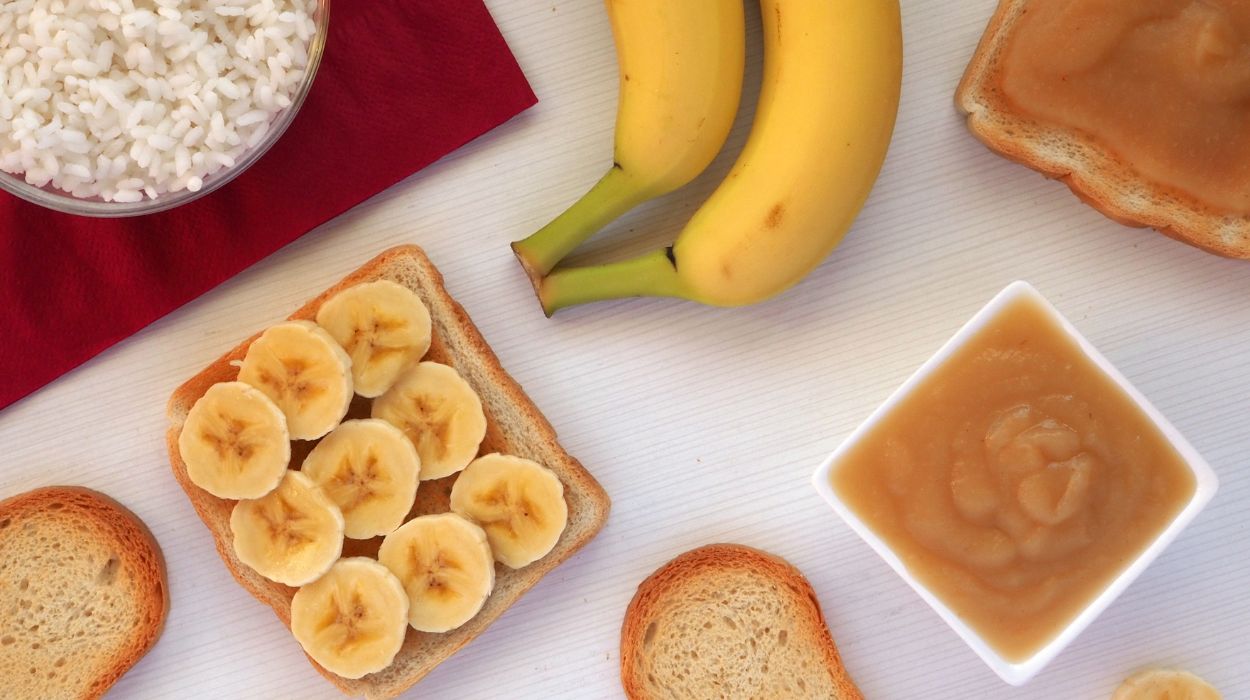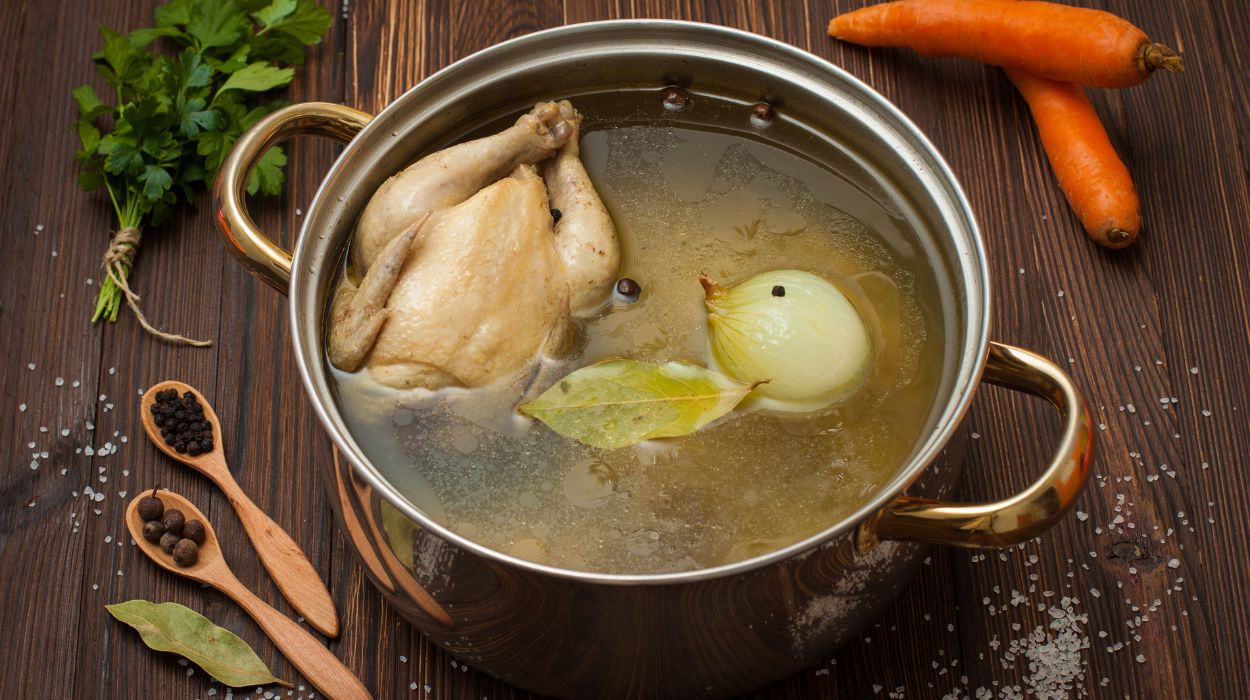When our stomachs don’t feel right, it can be hard to know what to eat and what to stay away from. Crackers and soda may seem like a good idea at the time, but research shows that these foods often make symptoms worse in the long run. On the other hand, there are some foods that can make us feel better and lessen the pain we are feeling.
Choosing what to eat when your stomach is upset will not only make you feel better in general but also promote a healthy lifestyle. This article will talk about what to eat when your stomach is upset and the foods you should avoid eating when you have an upset stomach. You can feel better and get rid of your pain by eating these recommended foods for an upset stomach. No matter if you are feeling sick, bloated, or have indigestion due to food poisoning, this advice will help you feel back like yourself quickly.
What To Eat When Stomach Is Upset?
BRAT

Bananas
There are many ways that bananas can help with indigestion. They are easy on the stomach and easy to break down. Potassium, which is found in bananas, is needed for fluid balance and for muscles and nerves to work.
Bananas have vitamin B6,[1] which makes you feel better and less stressed and anxious. Stress and worry can make digestive problems worse, so this can help.
Onward, bananas help you poop and pee, and they also calm an upset stomach. Bananas are good for you because their fiber helps your body digest food and maintain optimal bowel movements. This could make your stomach feel better and stop itching. Bananas that are already ripe have less gas and are easier to digest. If you’re sick, mash up a ripe banana and add it to your morning cereal or yogurt. You ought to feel better soon
White Rice
When stomachs are upset, white plain rice helps calm them down. It calms stomach pain with its mild, simple taste. Carbs give you energy, and rice is full of them.
If your stomach is upset, don’t eat foods that are high in fiber. White rice is better for stomach problems than brown rice because it has less fiber. White rice is also good because it reduces the acidity of stomach acid. Stomach aches and heartburn may get better. Furthermore, people who are sick can find and make white rice easily.
Applesauce
When your stomach is upset, applesauce is an excellent choice because it is easy to digest and soothes the GI tract. It’s low in fat and fiber, making it an excellent choice for those looking to improve their digestive health and lower stomach acid production. Applesauce contains a lot of vitamins and antioxidants, which are good for you.
Furthermore, people who have difficulty digesting solid foods can benefit greatly from applesauce. It calms an already upset stomach while still providing the body with essential nutrients and energy. Because applesauce contains natural sugars, it may provide relief to those suffering from nausea.
Toast
Toast is frequently recommended as one of the best foods to eat to alleviate stomach problems. Grain toast is appreciated as a stomach remedy due to its simplicity and blandness. Toast is an excellent food to eat when suffering from indigestion because it provides energy and helps to neutralize stomach acid.
White bread, wheat bread, and even multigrain bread can all be used to make toast. When it comes to avoiding irritable bowel syndrome (IBS)[2] and associated stomach disorders, white and wheat bread are preferable to whole grain bread.
Peanut butter, almond butter, honey, and jam are just a few of the many spreads that can be used to dress up a piece of toast. Choose non-sugary foods and low-fat toppings to avoid irritation.
Chicken Broth

When someone has a problem with their stomach, chicken broth is often recommended as a way to feel better. Chicken soup alongside bone broth has been used as a traditional cure for many years. When you have an upset stomach, the soup is great because the broth hydrates the digestive system and alleviates inflammatory bowel disease. Also, the soothing warmth of the soup can ease nausea, bloating, and other digestive symptoms by relaxing the muscles of the alimentary tract.
Oatmeal
For good reason, oatmeal is a popular breakfast option for many people. It’s a good choice for digestion because it’s low in fat and fiber. Carbohydrates give you energy, while fiber helps with digestion and bowel movements. When our stomachs are upset, we should eat foods that will not aggravate the situation. Oatmeal, which quickly settles an upset stomach, is ideal.
In addition to its soothing properties, oatmeal is a nutrient-dense food. Because of the vitamins, minerals, and antioxidants it contains, it is a good source of nutrition. The soluble fiber in oatmeal is beneficial to your digestive system and can aid in alleviating irritable bowel syndrome.
Ginger
Ginger is an excellent all-purpose food to keep on hand in case of stomach upset. It has been used as a natural cure for generations to alleviate the symptoms of gastrointestinal distress. The primary cause of stomach discomfort is inflammation in the digestive tract, but ginger’s anti-inflammatory properties can help alleviate this problem.
Ginger root[3] has been shown to have a stimulating effect on the digestive system, which can improve the digestive system’s overall functioning and reduce symptoms in addition to its anti-inflammatory effects. It can be consumed in several forms, including ginger tea, fresh or dried ginger, ginger ale, and ginger supplements.
Ginger is good for your health because it is low in calories and high in antioxidants, vitamins, and minerals. When you have an upset stomach, ginger is a great meal to reach for because it can quickly relieve the discomfort and calm the alimentary tract. Including ginger in your diet can help prevent digestive issues and improve your overall digestive health.
The Importance Of Being Mindful Of What You Eat When Your Stomach Is Upset
When our stomachs are upset, eating the wrong foods can make our symptoms worse and make the pain last longer. Fatty, fibrous, spicy, or fried foods may make it harder to digest. A well-balanced diet can help calm stomach pain.
Symptoms can be relieved and regular bowel movements[4] can be kept up by eating a bland diet – low-fat foods that are easy to digest. High-vitamin, high-mineral, and high-antioxidant foods taste good and help the body’s immune system to heal upset stomachs.
For our mental health, we should watch what we eat when we have a stomach ache. Eating well can help relieve stress, worry, and pain while eating poorly can make you feel worse. Lastly, what we eat can affect our physical and emotional health when we have a stomachache.
What Not To Eat When Stomach Is Upset?
If your stomach is upset, there are certain foods you should avoid. These include:
- High-fat foods: High-fat foods take longer to digest and can aggravate stomach problems like gas and nausea. Examples include fried foods, fatty meats, butter, and cheese.
- High-fiber foods: High-fiber foods can be difficult to digest and aggravate stomach problems such as cramps and gas. Whole grains, legumes, nuts, and seeds are all excellent examples.
- Spicy food can irritate the digestive system, cause severe abdominal pain, or aggravate stomach issues such as heartburn and indigestion.
- Acidic foods: Acidic foods can aggravate an upset stomach and worsen symptoms such as heartburn and indigestion. Examples include citrus fruits, tomatoes, and vinegar.
- Foods that have been processed. Processed foods[5] are frequently high in salt, sugar, and artificial ingredients, which can irritate the digestive system and exacerbate symptoms of indigestion.
- Dairy products: Some people have difficulty digesting dairy products, which can aggravate stomach issues such as bloating, gas, and diarrhea.
- Alcohol: Alcohol can upset your stomach and aggravate symptoms such as heartburn, morning sickness, nausea and vomiting, or diarrhea.
- Caffeinated beverages: Caffeine can upset your stomach and aggravate symptoms such as heartburn and indigestion.
- Carbonated beverages: These beverages can cause bloating and gas, exacerbating your upset stomach.
Conclusion
We need to be very selective with our diet if we don’t want to have any more stomach problems. Avoiding fatty, high-fiber, spicy, acidic, processed, dairy, alcohol, caffeine, carbonated foods, and sports drinks might help the digestive tract recover, alleviate discomfort, and improve overall health.
Low in both calories and fat, bland diets[6] like plain white rice, chicken broth, oatmeal, bananas, applesauce, and probiotic-rich foods are ideal for reducing pain and supporting health. The recommendations made here have the ability to restore normal digestive function and overall wellness.
Frequently Asked Questions
An upset stomach caused by the flu can be alleviated by white plain rice, chicken soup, oats, bananas, applesauce, or any other bland foods with low fat.
When you have stomach pain, certain foods can aggravate your symptoms and cause pain. Eating the right foods can help soothe abdominal pain and heal the digestive system.
When you have a stomach upset, you should avoid high-fat, high-soluble fiber, spicy, acidic, processed, dairy, alcohol, caffeine, and carbonated foods.
Yes. Some people have difficulty digesting dairy, which can aggravate gastrointestinal issues such as bloating, gas, and diarrhea.
No. The alimentary tract is irritated by alcohol, which worsens heartburn, nausea, vomiting, or diarrhea.
Smooth and easy-to-digest applesauce calms an upset stomach. It is also high in vitamins and antioxidants which are beneficial for overall health and well-being.
No. Caffeine can irritate the digestive tract, exacerbating heartburn and indigestion.
No, carbonated beverages can aggravate stomach discomfort (bloating, gas). If you have a stomach bug, stay away from them.
 Expert's opinion
Expert's opinion
